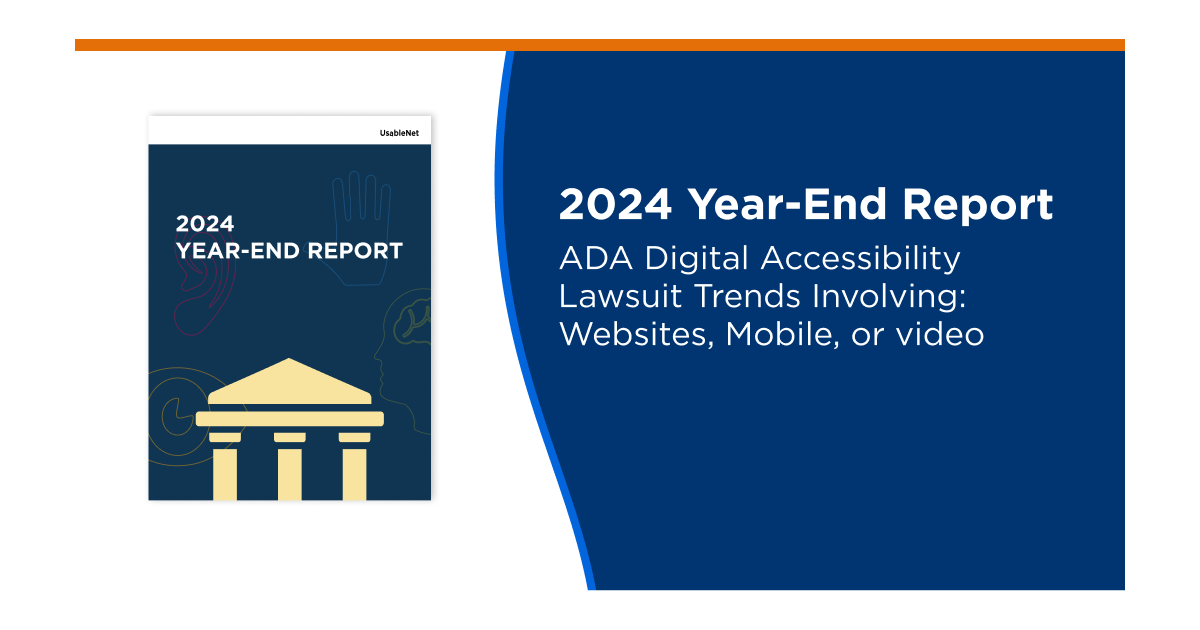This year has undoubtedly been a chaotic and unpredictable one, shaking up businesses all over the world and across almost every industry. Even the chaos of the pandemic, though, hasn’t stopped the need for accessible websites and apps.
Now that we’re halfway through the year, we felt it was important to dive into accessibility website lawsuit trends that we’ve seen in 2020 so that businesses could adapt and protect themselves accordingly.
In this post, we’re going to take a look at all the key trends you need to know right now, including the impact from the coronavirus, the importance of mobile, the impact of widgets and overlays, and the most essential WCAG standards.
How Many ADA Website Lawsuits Have There Been?
Across the country, the number of ADA website lawsuits have remained similar, decreasing from 1117 federal ADA cases in the second half of 2019 to 972 cases in the first half of 2020.
COVID-19 lockdowns did interfere with federal filings, but only for a short peperiodWe saw a big drop off at the end of March, and cases picked back up again once lockdown measures were lifted in some parts of the country towards the beginning of May.
While federal filings held relatively steady with a slight decrease, there’s one state where we saw a big increase: California.
California has the most cases filed of any state, where cases are being filed both under their Unruh Civil Rights Act and under the ADA in federal court. This is because any violation of the ADA is a violation on the Unruh Act, which outlaws discrimination based on factors like race, gender, sexuality, and disability.
The Role Mobile & Apps Play in ADA Lawsuits
While websites have historically been the focus of the majority of ADA lawsuits, lawsuits over apps and mobile are gaining traction. Perhaps fueled by a combination of the increase of mobile usage and the inclusion of apps in the Domino’s case, about 20% of all federal ADA digital cases are making claims that apps are inaccessible.
This isn’t surprising, as the DOJ joined a large number of cases between 2000-2015 on the side of plaintiffs establishing that both websites and mobile apps were subject to the ADA.
Widgets & Overlays: Why They’re Not Working
Widgets and overlays have recently become extremely popular amongst businesses trying to solve accessibility issues quickly. It seems fast, easy, and affordable, and it might offer surface-level accessibility improvements, like having a toolbar that allows users to have the site read content out loud (which screen readers can already do) or to increase text size.
Many of these widgets and overlays aren’t actually ADA-compliant, however. These widgets may only address one ADA concern, but it’s also common for lawyers to test the code of a site for accessibility. If the widget hasn’t changed the code itself, the lawyer will find the same problems they would have if you didn’t have it.
According to our research, a little over 100 companies were hit with lawsuits after investing in accessibility widgets and overlays, and some suits even listed the widget features as an extra hindrance to accessibility.
The WCAG Standard Taking Center Stage
The Web Content Accessibility Guidelines (WCAG) are often referenced in ADA lawsuits, and the WCAG 2.1AA has become the prevailing standard. More than 75% of all federal claims now reference WCAG 2.1AA, which has seventeen additional criteria above the previous version (2.0AA).
While there are no official laws or regulations about accessibility standards at this time, many lawyers are filing suits if they find that a business isn’t maintaining the highest accepted standard. And right now, that’s the WCAG 2.1AA. You can review all 17 new criteria here.
Get proactive with Web Accessibility Testing
Web and mobile accessibility are just as important as ever before, and they may even be more important now that many users are being forced to rely almost entirely on websites and mobile apps during the Coronavirus pandemic.
Make sure that your site is up to date with all the latest accessibility requirements and following the WCAG 2.1 AA standard. Remember that it’s much more cost-effective to fix a problem before you have to go through an expensive lawsuit that requires you to fix it anyway.
Want to learn more about accessibility app and website lawsuit trends in 2020 and how you can protect your business? Watch our full webinar here!









